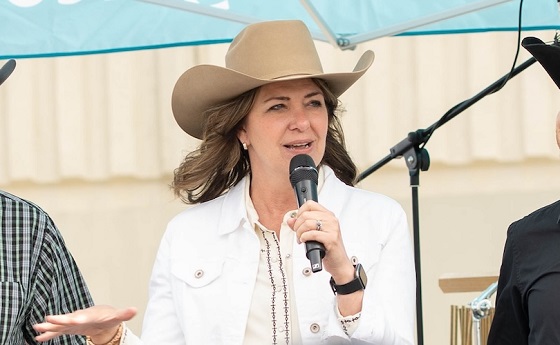Alberta
With new $6,000 grant and $4,000 tax credit, Province making adoption far more affordable for Alberta families

Making adoption more affordable
Alberta’s government is increasing subsidies, tax breaks and benefits so that more children can find their forever homes.
Budget 2023 includes $4 million per year in new funding over the next three years to make adoption more affordable. These new initiatives follow up on the commitment by Premier Danielle Smith to make adoption less arduous for Alberta families.
If the Financial Statutes Amendment Act, 2023 passes, the new $4-million package to make adoption more affordable for Albertans will cover the cost of dental, vision and other supplemental health benefits for children adopted in Alberta – regardless of whether they were adopted from the government system or through a private, licensed agency in the province. Alberta will become the first and only province to do this.
This funding support, which would take effect this fall, will help remove medical cost barriers to adoption, especially for children with specialized medical needs.
“We are following through on our commitment to make adoption more affordable for Albertans who are starting or growing their families. If a child can find a loving and stable home sooner – that’s good news for everyone, and most importantly, for the child. That is why we want to help reduce adoption expenses, so that more children can find their forever families.”
In addition to covering the costs of supplementary health benefits, the provincial adoption expenses tax credit amount would be increased by almost $4,000, to $18,210 from $14,365, to help cover the costs of adoption, matching the federal tax credit. This can be claimed by families adopting locally or internationally, and will be retroactive to Jan 1. The increased credit will be available to Albertans when they file their 2023 taxes in spring 2024.
“Adoption shouldn’t create a financial burden for parents starting or growing their families. These new measures will make it easier for a child who needs a home to become part of a family.”
About 5,000 adopted children in Alberta who have already found their forever family and future adopted children will be eligible for these benefits.
If the legislation passes, the cost of private adoption through licensed adoption agencies in Alberta will be subsidized by $6,000 for families that earn less than $180,000. The subsidy would help reduce the cost of adoption by 40 to 50 per cent.
“We are very pleased to see these additional supports for adoptive families through licensed adoption agencies. These new supports mean there is one less barrier for couples experiencing fertility loss and hoping to form a family through adoption. It also means less financial stress for families looking to adopt a child with medical or complex needs.”
“I think it’s fantastic for adoptive families and children to be supported this way. This initiative shows government is behind families and wants to help children in government care find permanent loving homes.”
“As an adoptive parent myself, I know first-hand the expenses and red tape and long processes that prospective parents face when considering adoption. These new supports mean more Albertans can welcome a child into their home, and together, they can build their forever family.”
Budget 2023 secures Alberta’s future by transforming the health-care system to meet people’s needs, supporting Albertans with the high cost of living, keeping our communities safe and driving the economy with more jobs, quality education and continued diversification.
Quick facts
- The number of approved adoptive families for children in government care has dropped by more than half – the lowest number of adoptive families in decades.
- Typically, there are about 100 approved families at any given time but there are only about 30 now.
- Currently, 27 children and youth are waiting to be matched with a loving, permanent home. Most of these children are over the age of seven, have special needs or are part of a sibling group.
- The government covers the costs associated with adopting a child in government care but fees to adopt a child internationally can range between $10,000 and $40,000, while fees through an agency can range between $11,000 and $15,000.
- Children’s Services launched an adoption recruitment campaign in early March focused on adopting children in government care.
Alberta
Danielle Smith slams Skate Canada for stopping events in Alberta over ban on men in women’s sports

From LifeSiteNews
The Alberta premier has denounced Skate Canada as ‘disgraceful’ for refusing to host events in the province because of a ban on ‘transgender’ men in women’s sports.
Alberta Premier Danielle Smith has demanded an apology after Skate Canada refused to continue holding events in Alberta.
In a December 16 post on X, Smith denounced Skate Canada’s recent decision to stop holding competitions in Alberta due to a provincial law keeping gender-confused men from competing in women’s sports.
“Women and girls have the right to play competitive sports in a safe and fair environment against other biological females,” Smith declared. “This view is held by a vast majority of Albertans and Canadians. It is also common sense and common decency.”
Women and girls have the right to play competitive sports in a safe and fair environment against other biological females.
This view is held by a vast majority of Albertans and Canadians. It is also common sense and common decency.
Skate Canada‘s refusal to hold events in… pic.twitter.com/n4vbkTx6B0
— Danielle Smith (@ABDanielleSmith) December 16, 2025
“Skate Canada‘s refusal to hold events in Alberta because we choose to protect women and girls in sport is disgraceful,” she declared.
“We expect they will apologize and adjust their policies once they realize they are not only compromising the fairness and safety of their athletes, but are also offside with the international community, including the International Olympic Committee, which is moving in the same direction as Alberta,” Smith continued.
Earlier this week, Skate Canada announced their decision in a statement to CBC News, saying, “Following a careful assessment of Alberta’s Fairness and Safety in Sport Act, Skate Canada has determined that we are unable to host events in the province while maintaining our national standards for safe and inclusive sport.”
Under Alberta’s Fairness and Safety in Sport Act, passed last December, biological men who claim to be women are prevented from competing in women’s sports.
Notably, Skate Canada’s statement failed to address safety and fairness concerns for women who are forced to compete against stronger, and sometimes violent, male competitors who claim to be women.
Under their 2023 policy, Skate Canada states “skaters in domestic events sanctioned by Skate Canada who identify as trans are able to participate in the gender category in which they identify.”
While Skate Canada maintains that gender-confused men should compete against women, the International Olympic Committee is reportedly moving to ban gender-confused men from women’s Olympic sports.
The move comes after studies have repeatedly revealed what almost everyone already knew was true, namely that males have a considerable innate advantage over women in athletics.
Indeed, a recent study published in Sports Medicine found that a year of “transgender” hormone drugs results in “very modest changes” in the inherent strength advantages of men.
Additionally, male athletes competing in women’s sports are known to be violent, especially toward female athletes who oppose their dominance in women’s sports.
Last August, Albertan male powerlifter “Anne” Andres was suspended for six months after a slew of death threats and harassments against his female competitors.
In February, Andres ranted about why men should be able to compete in women’s competitions, calling for “the Ontario lifter” who opposes this, apparently referring to powerlifter April Hutchinson, to “die painfully.”
Interestingly, while Andres was suspended for six months for issuing death threats, Hutchinson was suspended for two years after publicly condemning him for stealing victories from women and then mocking his female competitors on social media. Her suspension was later reduced to a year.
Alberta
Alberta’s huge oil sands reserves dwarf U.S. shale

From the Canadian Energy Centre
By Will Gibson
Oil sands could maintain current production rates for more than 140 years
Investor interest in Canadian oil producers, primarily in the Alberta oil sands, has picked up, and not only because of expanded export capacity from the Trans Mountain pipeline.
Enverus Intelligence Research says the real draw — and a major factor behind oil sands equities outperforming U.S. peers by about 40 per cent since January 2024 — is the resource Trans Mountain helps unlock.
Alberta’s oil sands contain 167 billion barrels of reserves, nearly four times the volume in the United States.
Today’s oil sands operators hold more than twice the available high-quality resources compared to U.S. shale producers, Enverus reports.
“It’s a huge number — 167 billion barrels — when Alberta only produces about three million barrels a day right now,” said Mike Verney, executive vice-president at McDaniel & Associates, which earlier this year updated the province’s oil and gas reserves on behalf of the Alberta Energy Regulator.
Already fourth in the world, the assessment found Alberta’s oil reserves increased by seven billion barrels.
Verney said the rise in reserves despite record production is in part a result of improved processes and technology.
“Oil sands companies can produce for decades at the same economic threshold as they do today. That’s a great place to be,” said Michael Berger, a senior analyst with Enverus.
BMO Capital Markets estimates that Alberta’s oil sands reserves could maintain current production rates for more than 140 years.
The long-term picture looks different south of the border.
The U.S. Energy Information Administration projects that American production will peak before 2030 and enter a long period of decline.
Having a lasting stable source of supply is important as world oil demand is expected to remain strong for decades to come.
This is particularly true in Asia, the target market for oil exports off Canada’s West Coast.
The International Energy Agency (IEA) projects oil demand in the Asia-Pacific region will go from 35 million barrels per day in 2024 to 41 million barrels per day in 2050.
The growing appeal of Alberta oil in Asian markets shows up not only in expanded Trans Mountain shipments, but also in Canadian crude being “re-exported” from U.S. Gulf Coast terminals.
According to RBN Energy, Asian buyers – primarily in China – are now the main non-U.S. buyers from Trans Mountain, while India dominates purchases of re-exports from the U.S. Gulf Coast. .
BMO said the oil sands offers advantages both in steady supply and lower overall environmental impacts.
“Not only is the resulting stability ideally suited to backfill anticipated declines in world oil supply, but the long-term physical footprint may also be meaningfully lower given large-scale concentrated emissions, high water recycling rates and low well declines,” BMO analysts said.
-

 Community2 days ago
Community2 days agoCharitable giving on the decline in Canada
-

 Business2 days ago
Business2 days agoCanada’s recent economic growth performance has been awful
-

 Alberta2 days ago
Alberta2 days agoCanada’s New Green Deal
-

 armed forces2 days ago
armed forces2 days agoOttawa’s Newly Released Defence Plan Crosses a Dangerous Line
-

 Health1 day ago
Health1 day agoSaskatchewan woman approved for euthanasia urged to seek medical help in Canada rather than US
-

 Alberta1 day ago
Alberta1 day agoAlberta’s huge oil sands reserves dwarf U.S. shale
-

 Indigenous1 day ago
Indigenous1 day agoResidential school burials controversy continues to fuel wave of church arsons, new data suggests
-

 Business2 days ago
Business2 days agoCOP30 finally admits what resource workers already knew: prosperity and lower emissions must go hand in hand






